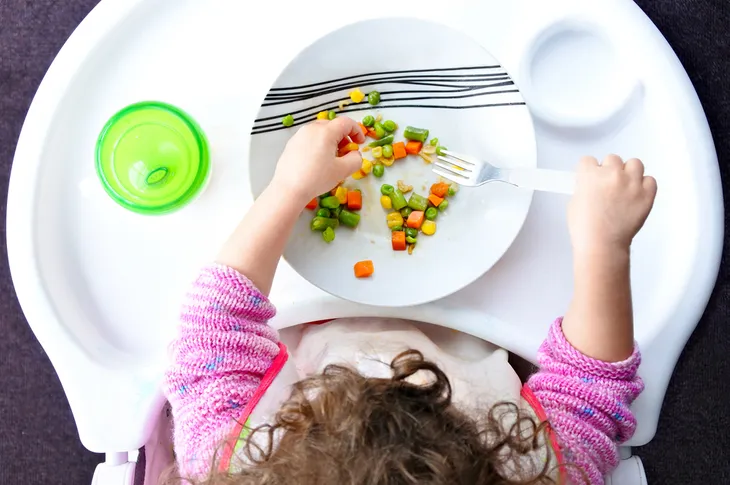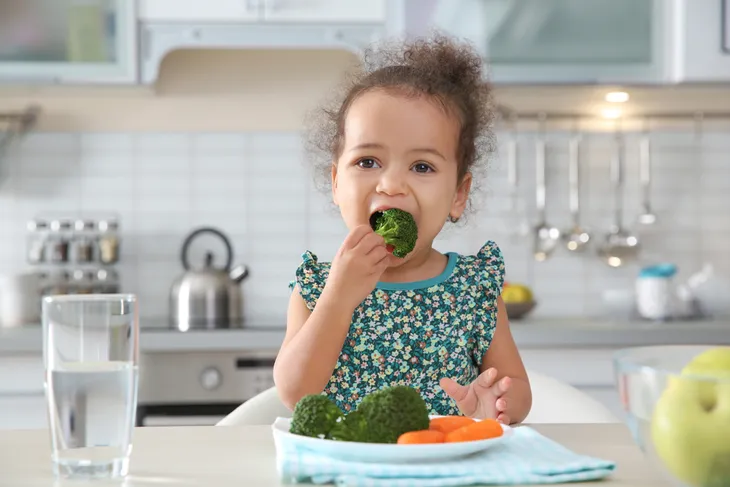Toddlers are in a crucial stage of development both mentally and physically, and need all the nutrients they can get. However, actually putting that into practice can be a challenge for some, as many 3-year olds decide they’re not going to eat anything you offer them.
This can be particularly upsetting to you as a parent, who may feel you’re doing something wrong (maybe it’s your cooking?). However, chances are you’re not—you just have to learn to navigate the tricky world of fussy toddlers. Here are seven tips to get toddlers to eat a more diverse range of foods and (hopefully) not turn their nose up at what you’re serving…
Don’t Overdo The Milk
The Women’s and Children’s Health Network focuses mostly on breast milk, but this can apply to any type of milk your little one happens to be drinking. The source notes that as long as your toddler seems to be taking to breast milk, they should continue to feed this way and (theoretically) should still be able to eat 3-small meals per day.
Some toddlers start drinking cow’s milk at 1-year of age, but if your child seems to be happily eating the food you offer, then there’s no need to supplement their diet with extra milk, adds the source. When your child is aged 2, you can switch from creamier milk to lower-fat milk, it explains. Keep an eye on juice and water intake as well, which both can also fill up your fussy eater.
Reduce Distractions
Toddlers get easily distracted (don’t we all these days?) and can end up pushing aside their plate to play the newest game on your tablet. For this reason, you should eliminate all potential distractions from their eating environment from televisions, toys and even pets, suggests BabyCentre UK.
However, while you extract certain external factors from mealtime, you can insert conversation. Chat with your toddler at their level, and better yet, try to include other toddlers during mealtime as much as possible. Your little one is possibly more likely to eat when seeing other kids digging in, adds the source.
Keep Consistent Mealtimes
The Better Health Channel explains that it’s important to establish a routine for eating, so junior can start to expect mealtime (and for the television to be turned off).
However, the same source also notes, “Don’t fight over the issue of sitting down at mealtimes. Concentrate on making mealtimes fun and enjoyable so that your child is more likely to want to stay at the table.” Hopefully, this will help your little one get excited about coming to the table and seeing what gourmet microwave food you’ve prepared.
Don’t Bribe Toddlers with Treats
As an adult, you may brave eating those Brussels sprouts when you know you have chocolate pudding waiting for you. However, a toddler’s brain is not wired the same way. If you promise some kind of treat to a kid for finishing their main course, they get fixated on that treat and the plan will backfire on you.
There could be some health concerns linked with bribing kids with treats—SuperKidsNutrition.com explains that this practice of offering rewards for eating more can prevent kids from listening to their natural hunger cues, which has been linked to childhood obesity, notes the source.
Keep Realistic Expectations
Your child is not going to sit down, put their bib on and expect a 4-course meal. In fact, toddlers don’t need as much food as parents often think they do—they usually eat just enough to keep them full (this is actually healthy, despite your instincts telling you otherwise).
Raising Children, an Australian parenting site, explains that instead of forcing mass quantities of food on your toddler, have them try at least one bite of everything on the plate or take a certain number of mouthfuls (as long as that number isn’t too high that they’re getting upset).
Don’t Give up on New Foods
If you really want your child to eat baby carrots, for example, then you may have to present it to them more than once, according to Parents.com. In fact, the source notes that it could take up to 15-times before they decide they like it.
It adds that once you get your toddler over the hurdle of not accepting a particular food, they may be more cooperative with other new foods in the future and require less tries to eat it (an average of six attempts, to be more exact). However, many parents tend to give up after a couple of tries because it can cause a tantrum and disrupt the entire family’s mealtime, the source explains.
Don’t Take it Personally
Your child not eating doesn’t mean you need to take cooking classes, and it doesn’t mean they dislike you. Serve in small portions so you’re not wasting food if junior doesn’t approve of it right away (or eat it yourself to show them how good it is).
But more importantly, getting angry when your child pushes away their plate can actually magnify that behavior, says Cooking Light. “The less of an issue you make of it now, the less of a fuss you will get the next time,” explains the source. Just wait it out a bit and try to keep a positive attitude, and (hopefully) things will fall into place. If not, then you can start to think of getting advice from a doctor or dietician, especially if there are development concerns.









